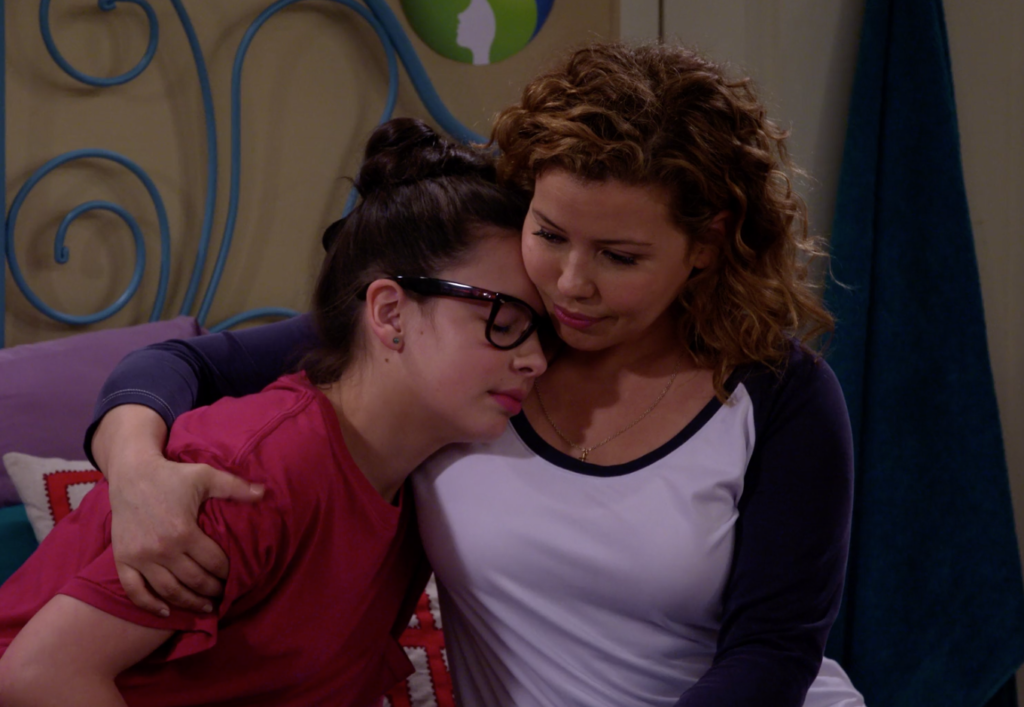 The sitcom never died, but it was on the ropes due to ”Seinfeld” and ”30 Rock.” Why? Well, with most sitcoms there was hugging and learning. But ”Seinfeld” and ”30 Rock” seem to break that mold when they made sure hugging and learning was not that important. ”Friends” was better at making sure the characters remained friends (How could they not? The show is called ”Friends”), so there was hugging. Learning? Well, every now and then, that seemed to happen. But these shows (wildly popular as they were) had more than a dab of cynicism coursing through their veins. There was humor, sure, but it was a dark undercurrent of humor that pervaded many storylines. And you know what? May the TV gods bless em for that because the sitcom formula was getting pretty stale pre-”Seinfeld.” We knew when to laugh, when give in to getting your heartstrings pulled, and when to understand the moral of the story. And how could we not? Our emotional responses were conditioned by the same format week after week.
The sitcom never died, but it was on the ropes due to ”Seinfeld” and ”30 Rock.” Why? Well, with most sitcoms there was hugging and learning. But ”Seinfeld” and ”30 Rock” seem to break that mold when they made sure hugging and learning was not that important. ”Friends” was better at making sure the characters remained friends (How could they not? The show is called ”Friends”), so there was hugging. Learning? Well, every now and then, that seemed to happen. But these shows (wildly popular as they were) had more than a dab of cynicism coursing through their veins. There was humor, sure, but it was a dark undercurrent of humor that pervaded many storylines. And you know what? May the TV gods bless em for that because the sitcom formula was getting pretty stale pre-”Seinfeld.” We knew when to laugh, when give in to getting your heartstrings pulled, and when to understand the moral of the story. And how could we not? Our emotional responses were conditioned by the same format week after week.
Well, now it seems the ”Seinfeld” formula may be running its course. Not that it’s dead, mind you. It’s just that with scramble to capture that audience, it leads to copycat shows that diminish the force of what made something like ”Seinfeld” so brilliant. Once a market is saturated with shows that have a similar comedy vibe, it means there’s a niche that’s not being served — and that’s why the Netflix reboot of ”One Day at a Time” is so refreshing. The show brings back all those tried and true elements that made sitcoms of this caliber so popular to begin with. In other words, ”One Day at a Time” brings back hugging and learning in an effective way.
For those who watched the original series that aired on CBS from 1975-1984, you know the story centered on a recently divorced mother (Bonnie Franklin) moving from a small town in Indiana to Indianapolis where she raises her teenage daughters (Mackenzie Phillips and Valerie Bertinelli) in a rented apartment. The show was created by Norman Lear, Whitney Blake (Meredith Baxter’s mother) and Allan Manings, and had a pretty good run. Shows like ”All in the Family,” ”Good Times,” ”The Jeffersons” ”Maude” and ”Mary Hartman, Mary Hartman” demonstrated Lear’s ability to tackle issues that seemed taboo in American culture in a sitcom or even a soap opera format. ”One Day at a Time” — like other shows developed by Norman Lear — didn’t shy away from issues that were controversial. Indeed, episodes give a lot of air time to topics like divorce, teenage sex, running away, singles bars, and even underage drinking.
With the rebooted series on Netflix, some of the elements are like the original, but much has changed. The new series stars Justina Machado as Penelope, a Cuban-American mother of two who is raising her 12-year-old son (Marcel Ruiz) and 15-year-old daughter (Isabella Gomez) after separating from her husband (who is in Afghanistan as a solider). Penelope is also a soldier (but a reservist) and works as a nurse to keep her family fed. Her mother Lydia (the fantastic, series-saving Rita Moreno) lives with the family in a rental apartment in Echo Park, California. Her landlord is Schneider (Todd Grinnell — doing a good Paul Rudd impersonation) is not like Pat Harrington’s Schneider in the original series. Sure, he’s a landlord, and he seems to be a welcome part of the family, but he has baggage (he’s a recovering alcoholic). Lydia is Cuban first, and American second. Penelope is Cuban-American, while her daughter, Elena, has shed most of her Cuban ethnic mores and embraces a mÁ©lange of cultural influences (in the premiere episode, she’s reading a book about Dorothy Parker, seems to like alternative rock, and surrealist art). And because she’s a teenager who wants to be her own person, she balks at her mother’s desire for a QuinceaÁ±era — seeing it as a sexist ceremony where a 15-year-old girl crosses the threshold into womanhood. Indeed, the conflict surrounding the QuinceaÁ±era makes up much of the first episode. The other conflicts involve Penelope’s separation from her husband, her refusal to take anti-anxiety meds, her son Alex’s shoe addiction (he needs at least five pairs of expensive sneakers to fit in at middle school) and Penelope’s struggles with money while keeping her family together.
Like those who grew up watching the original series, when I heard about the premise of the reboot, I had a knee-jerk ”NO!” reaction. But after watching the first episode, that ”NO!” gave way to a ”yes” within the first 10-minutes. The jokes come fast, and they don’t always hit. But when they do, they are truly funny. Also, though Penelope is separated, there’s more than a dab of optimism with this show. Through all the wisecracking, it’s clear the family loves each other a lot, and while the kids seem to adjust to their new reality without a dad, it’s Penelope who needs their love and support to help her through the pain of her crumbling marriage. It’s also refreshing to see a Cuban-American family at the center of sitcom. And who knows? In an era when certain immigrant groups have been vilified in politics and the press, a show like ”One Day at a Time” could, in a small way, help soothe some of the hysteria surrounding ethnic change in the U.S.








Comments